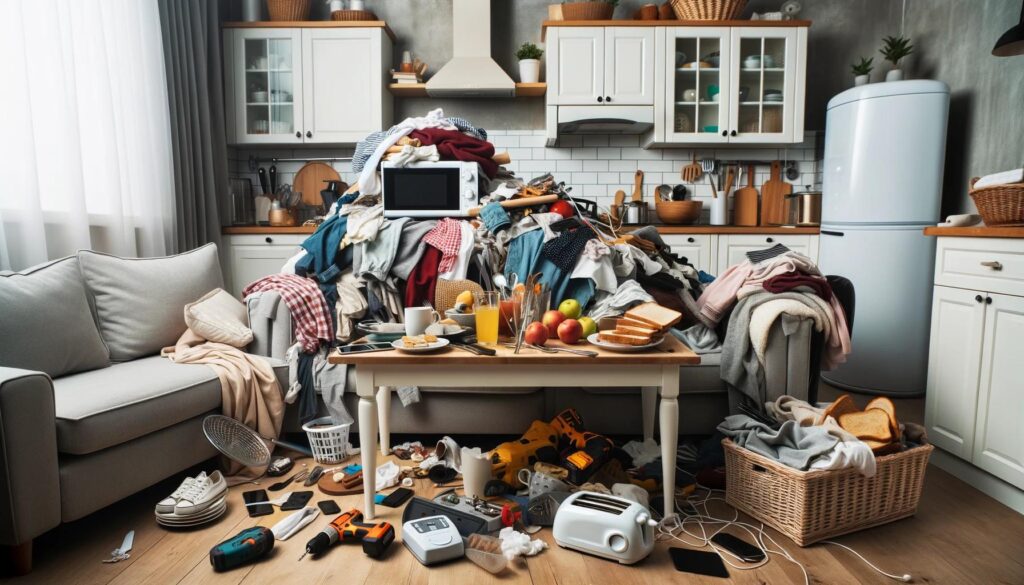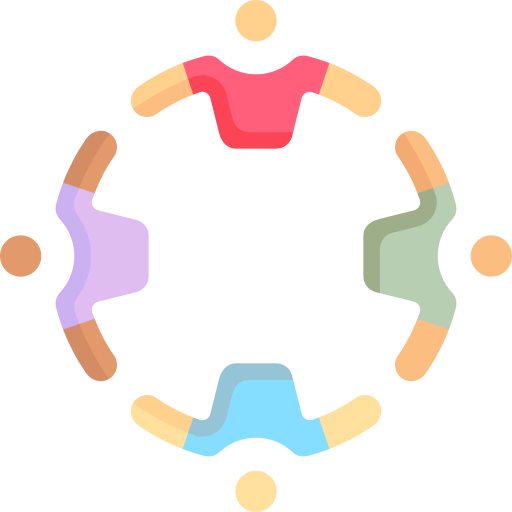We all know that feeling. You open your closet to find a heap of clothes, many of which you haven’t worn in years, highlighting the significant item usage issues many of us face.
Your kitchen counters are a gallery of seldom-used appliances and gadgets, a scenario that would feature prominently on any declutter checklist. And your phone? A digital realm overflowing with unused apps and countless photos, a clear sign of the digital clutter that’s all too common.
Clutter manifests in our lives in various ways, from the physical mess in our homes to the overwhelming digital noise and mental chaos. This guide embarks on a transformative journey of decluttering that goes beyond mere physical spaces to encompass your mental and digital worlds.
With insightful tips and psychology-backed advice, we’ll show you how to simplify your whole life with actionable steps – because you deserve to feel lifted by the lightness that comes from clearing out the clutter, both inside and out.
The Benefits of Decluttering Your Life
Decluttering your life can have huge benefits for both your physical and mental wellbeing. As we dig into closets and cabinets and clear out the clutter, we find ourselves feeling lighter and less stressed.
Reducing excess stuff in our homes and schedules helps us focus on what really matters. When our spaces are clear of clutter and chaos, we can think more clearly and feel more at ease. A decluttered environment leads to a decluttered mind.
By decluttering, we gain:
- Increased productivity. Without the distraction of excess stuff, we can focus better and accomplish more.
- Reduced stress and anxiety. Clutter overwhelms our senses and stresses us out. Decluttering creates calm.
- Improved relationships. With less clutter demanding our attention, we have more time and energy to connect with loved ones.
- Better sleep. A clutter-free bedroom is a sanctuary that promotes rest and rejuvenation.
- A sense of control. When we declutter, we are taking control of our spaces and schedules. This gives us an empowering sense of purpose and direction.
The benefits of a simplified, decluttered life are vast. As the excess falls away, we gain clarity, calmness, and a renewed sense of purpose. A decluttered life is a life well-lived. Making space for what matters most leads to greater peace and joy.
Decluttering Your Physical Environment
As the saying goes, “out of sight, out of mind.” When our homes and workplaces are filled with clutter, it creates distraction and stress. Let’s start by tackling the mess around us.
- Clear your nightstand of non-essential items:
Focus on creating a serene bedroom space by removing clutter from your nightstand. Keep only the essentials like a lamp, a book, or a glass of water. This small change can significantly enhance the calmness of your sleeping area. - Organize your purse or wallet:
Regularly go through your purse or wallet to discard old receipts, expired cards, and unnecessary items. This not only makes it easier to find what you need but also lightens your load. - Declutter your fridge and clear the front of it:
Clean out expired and unused items from your refrigerator. Organizing the shelves helps in spotting what you need quickly. Keep the front of the fridge clear of magnets and papers to maintain a neat kitchen look. - Declutter clothes and create a minimalist wardrobe:
Evaluate your clothing and keep only those items that fit well, are in good condition, and make you feel great. A minimalist wardrobe simplifies choosing outfits and keeps your space tidy. - Discard outdated makeup:
Go through your makeup collection and throw away products that are expired or rarely used. This not only frees up space but is also better for your skin health. - Regularly declutter rubbish and recycling:
Make it a habit to regularly clear out trash and sort recyclables. This prevents the accumulation of waste and maintains a cleaner living environment. - Organize kitchen worktops and other flat surfaces:
Keep kitchen counters and other flat surfaces clear of unnecessary items. A decluttered worktop enhances the functionality of the space and makes cleaning easier. - Organize paperwork:
Sort through papers, bills, and documents. Discard what’s no longer needed and file important papers neatly. This reduces stress and makes it easier to find documents when needed. - Declutter your car:
Regularly clean out your car, removing trash, and organizing essential items. A tidy car makes for a more pleasant and less distracting driving experience. - Regularly do laundry and housework:
Keeping on top of laundry and regular cleaning prevents the buildup of clutter and maintains a pleasant home environment. - Toss physical trash:
Walk through each room with a trash bag, ruthlessly discarding knick-knacks, papers, and old cosmetics. Separate items for donation or recycling as you go. - Get rid of unnecessary physical items:
Evaluate each item in your home. If it hasn’t been used in a year or doesn’t bring joy, consider getting rid of it. This helps in creating more space and a tranquil environment. - Borrow instead of buying:
Next time you want something, think if it isn’t simpler to borrow instead or buying it. - Shred, recycle, or trash outdated items:
Dispose of outdated items like old magazines, expired coupons, and obsolete electronics. Shredding sensitive documents ensures privacy and frees up space. - Tidy up your workspace and vehicle:
Regularly clean and organize your desk and car. A clutter-free workspace increases productivity, and a clean vehicle improves your travel experience. - Declutter rooms by assessing item necessity and usage:
In each room, evaluate every item’s necessity and frequency of use. If it’s not essential or seldom used, it might be time to let it go. - Declutter your kitchen, focusing on unused items:
Remove gadgets, utensils, and appliances that are not regularly used. This frees up space and makes your kitchen more functional and enjoyable to use. - Organize closets by assessing clothing needs:
Evaluate your clothing and organize your closet to reflect your current lifestyle and preferences. This makes getting dressed simpler and your closet easier to manage. - Declutter your closet by removing unused clothing and accessories:
Go through your wardrobe and donate or discard items that you no longer wear. This creates more space and makes it easier to find what you’re looking for. - Declutter duplicates and extras in your closet and kitchen:
Identify and remove duplicate items or those that serve the same purpose. This simplification can significantly reduce clutter. - Start decluttering with specific, contained areas like the fridge:
Begin decluttering with manageable, confined areas. This provides a sense of accomplishment and motivates you to tackle larger spaces. - Arrange your bedroom closet for easier access to items:
Organize your closet in a way that frequently used items are easily accessible. This saves time and reduces frustration. - Keep your everyday bag organized with dedicated pouches:
Use pouches or compartments in your bag for specific items like keys, phone, and wallet. This organization saves time and prevents clutter in your bag. - Start small and don’t overwhelm yourself:
Begin your decluttering journey with small, manageable tasks. This approach prevents burnout and gradually builds momentum. - Determine if items bring you joy:
While sorting through your belongings, keep items that make you happy and let go of those that don’t. This philosophy ensures your space is filled with items that positively impact your mood. - Use the four-box method for sorting items:
When decluttering, use four boxes labeled ‘Keep’, ‘Donate’, ‘Store’, and ‘Trash’. This method simplifies decision-making and organizes the process. - Only buy items that serve a purpose:
Before making a purchase, consider if the item is necessary and serves a purpose. This mindset helps in reducing future clutter. - Create a sorting system for decluttering your house:
Establish a system for sorting items during decluttering. This could include categories like ‘keep’, ‘donate’, ‘sell’, or ‘discard’, making the process more structured. - Decide what to keep, toss, and store:
Make decisive choices about what to keep, discard, or store. This clear decision-making helps in maintaining a clutter-free environment. - Declutter your workspace by organizing papers and desk items:
Keep your desk organized by regularly sorting papers and keeping only essential items. A decluttered desk fosters a productive and focused working environment. - Go digital with photos and memories:
Digitize photos and sentimental items to reduce physical clutter while preserving memories. - Use a Maybe Box for items you’re unsure about:
For items you’re uncertain about discarding, place them in a ‘Maybe Box’. After a few months, if you haven’t needed them, consider letting them go. - Get help from others for more objective decisions:
Invite a friend or family member to help with decluttering decisions. Their objective perspective can be helpful in making tough choices. - Start decluttering with small, manageable tasks:
Begin with small tasks like organizing a drawer or a shelf. These manageable tasks provide a sense of achievement and motivation to continue. - Keep decluttering simple and focus on one area at a time:
Focus on one area or category at a time to avoid feeling overwhelmed. This approach ensures thorough decluttering and reduces stress. - Let go of things you don’t use:
If you haven’t used an item in a long time, it’s likely you don’t need it. Letting go of such items frees up space and reduces clutter. - Remove items that make you feel bad:
Get rid of items that evoke negative emotions or memories. Your space should be a sanctuary of positive energy and comfort.

Decluttering Your Digital Space: Apps, Files and More
As we spend more and more time on our devices, digital clutter has become an increasingly frustrating problem. Let’s tackle it together:
- Remove unused apps from your phone:
Regularly review the apps on your phone and uninstall those you no longer use. This not only frees up storage space but also simplifies your digital interface. - Update your contact list and address book:
Go through your contacts, removing outdated entries and organizing the remaining ones. This makes it easier to find important contacts and keeps your list relevant. - Organize emails and unsubscribe from unnecessary newsletters:
Take time to organize your inbox by creating folders for different categories of emails. Unsubscribe from newsletters or mailing lists that you no longer find useful to reduce inbox clutter. - Back up everything stored digitally:
Regularly back up important digital files to an external drive or cloud service. This not only declutters your device but also ensures you don’t lose valuable data. - Delete digital items that don’t serve you:
Regularly review and delete files, photos, and documents that are no longer needed. This helps maintain a streamlined, organized digital environment. - Organize files and apps:
Categorize and arrange files and apps into folders or groups. This organization makes it easier to find what you need and keeps your digital space tidy. - Unsubscribe from emails and remove unused apps:
Actively manage your digital intake by unsubscribing from unneeded emails and deleting unused apps. This reduces digital clutter and increases efficiency. - Organize your cell phone by deleting unused apps and contacts:
Keep your cell phone organized by regularly auditing apps and contacts. This decluttering ensures your phone is efficient and easy to navigate. - Organize your digital space for easier file access:
Arrange digital files logically in folders and use clear naming conventions. This organization makes it quicker to locate files and keeps your digital space orderly. - Declutter digital items like unused apps and social media:
Evaluate your digital presence, particularly on social media, and remove apps or accounts that no longer add value to your life. This reduces digital noise and distraction. - Simplify photos and paper storage:
Digitize physical photos and important papers to reduce clutter. Store these digitally in organized folders for easy access and safekeeping. - Go paperless with important documents:
Opt for digital versions of bills, statements, and important documents when possible. This reduces physical clutter and helps in maintaining a more organized digital archive. - Automate tasks where possible:
Use digital tools to automate repetitive tasks like bill payments or regular reminders. Automation saves time and reduces the cognitive load of keeping track of various tasks. - Simplify your goals:
Use digital tools to track and manage your goals. Keeping digital goal lists can help you stay focused and organized, leading to more efficient goal achievement. - Make decluttering a social event:
Engage with friends or online communities in decluttering challenges. This can make the process more enjoyable and provide support and accountability. - Simplify your calendar and digital life by reducing commitments and digital clutter:
Regularly review and simplify your digital calendar. Remove old appointments, clear reminders that are no longer relevant, and unsubscribe from digital commitments that no longer serve you.

Decluttering Your Mind: Reducing Mental Clutter
We all deal with mental clutter in our lives. Racing thoughts, worries about the future, regrets about the past, and general anxiety can crowd our minds and make it difficult to focus. Decluttering our mental space is just as important as decluttering our physical space (stats on clutter show us how bad it can be to our physical and mental health).
Here are some tips to help clear your mind and gain more mental clarity:
- Clarify your path by focusing on one area of your life each month:
Dedicate each month to improving or decluttering a specific aspect of your life. This focused approach allows for deeper engagement and more meaningful progress in each area. - Celebrate success to enjoy the journey of decluttering:
Acknowledge and celebrate your achievements in decluttering, whether they are big or small. This positive reinforcement makes the process more enjoyable and motivating. - Write a Not-To-Do list:
Create a list of tasks or habits you want to avoid. This helps in setting clear boundaries and priorities, and in reducing unnecessary mental clutter. - Declutter your mind by brainstorming stressors:
Identify and write down what causes you stress. Recognizing these elements can be the first step towards managing and reducing them, leading to a clearer mind. - Block out time for yourself:
Regularly schedule time for self-care and personal activities. This ensures you have space to relax and recharge, crucial for mental well-being. - Be mindful of different types of clutter:
Stay aware of the various forms of clutter in your life, be it physical, digital, or mental. Recognizing these can help you address them more effectively. - Spend time sitting still:
Allocate time to simply sit in stillness, without distractions. This practice can aid in calming the mind and reducing mental clutter. - Get clear on your priorities:
Take time to reflect on what is truly important to you and align your activities and goals accordingly. This clarity can reduce mental overload and increase life satisfaction. - Use decluttering journal prompts:
Engage with journal prompts that encourage you to reflect on and organize your thoughts. This can be a therapeutic way to process and declutter your mind. - Stop multitasking:
Focus on one task at a time. This reduces mental strain and increases efficiency, as multitasking often leads to reduced productivity and increased stress. - Practice mindfulness:
Incorporate mindfulness practices into your daily routine. Mindfulness helps in staying present and can significantly reduce mental and emotional clutter. - Unplug and unwind regularly:
Take breaks from digital devices and social media. Regular disconnection helps in reducing mental fatigue and promotes better mental health. - Live with intention and make mindful purchases:
Be deliberate in your actions and choices, especially with purchases. Living intentionally helps in reducing unnecessary mental and physical clutter. - Let go of comparisons and reduce social media time:
Minimize time spent on social media and avoid comparing your life to others’. This can lead to a healthier self-image and less mental clutter. - Clear your mind of negative thoughts:
Practice techniques such as meditation or positive affirmations to combat negative thinking. A positive mindset reduces mental clutter and enhances overall well-being. - Make space in your heart, soul, and mind by letting go of emotional clutter:
Reflect on and release emotions that no longer serve you, such as grudges or regrets. This emotional decluttering can lead to greater inner peace. - Enjoy the simplicity and space created by decluttering:
Take time to appreciate the calm and clarity that comes from having a decluttered space, both physically and mentally. This appreciation reinforces the benefits of a decluttered lifestyle. - Deal with resistance from others by leading by example and discussing benefits:
When facing resistance to decluttering from others, lead by example and share the positive impacts it has had on your life. This can encourage and motivate them to consider decluttering. - Increase confidence by starting with small, achievable goals:
Build your confidence in managing clutter by setting and achieving small goals. This gradual approach can lead to more significant changes and a sense of accomplishment. - Don’t wait to start decluttering; begin with simple goals and track your progress:
Start decluttering now with easy, attainable objectives. Tracking your progress can provide motivation and a clear sense of achievement. - Declutter your schedule by evaluating and reducing unnecessary commitments:
Assess your schedule and reduce commitments that are not essential or fulfilling. This creates more time for meaningful activities and reduces stress. - Plan meals in advance:
By planning meals ahead, you reduce the daily decision-making load and streamline your grocery shopping, leading to less mental clutter. - Make a concise To-Do list for the next day:
Prepare a short and focused to-do list for the next day. This helps in prioritizing tasks and clears your mind from worrying about remembering everything. - Maintain an ongoing shopping list:
Keep a continuously updated shopping list to avoid last-minute rushes and forgotten items. This organization can ease mental load and make shopping more efficient. - Create routines for your home:
Establishing routines for daily tasks can reduce the mental effort of planning and decision-making, creating a more peaceful and predictable environment. - Build good decluttering habits:
Cultivate habits that support regular decluttering in all aspects of your life. Consistent habits lead to a continuously clearer space and mind. - Experiment with decluttering different areas:
Try decluttering various aspects of your life to discover what works best for you. This experimentation can lead to more effective strategies for mental clarity. - Delegate tasks:
Share responsibilities with family, friends, or colleagues. Delegating tasks can significantly reduce your mental load and improve efficiency. - Simplify your mornings:
Streamline your morning routine for a less rushed and more mindful start to the day. A simple morning routine sets a calm tone for the rest of the day. - Conduct a calendar audit to remove unnecessary tasks:
Regularly review your calendar and remove tasks or commitments that are no longer necessary or beneficial. This decluttering can free up valuable time and reduce stress. - Adopt a no-freebies policy:
Avoid accepting free items or samples unless they are truly useful to you. This helps in preventing the accumulation of unnecessary physical and mental clutter. - Reconsider your daily routine:
Reflect on your daily routine and make adjustments to remove unnecessary or stressful activities. Optimizing your routine can lead to a more relaxed and productive day. - Ditch debt for a clutter-free financial life:
Focus on paying off debts and avoiding new ones. Financial clarity can significantly reduce mental stress and contribute to overall well-being. - Simplify your schedule by removing unnecessary commitments:
Continuously assess and simplify your schedule to focus on what’s truly important. This can lead to a more balanced and fulfilling life with less mental clutter. - Make decluttering a priority:
Treat decluttering as an essential part of your routine. Prioritizing it can lead to a more organized life and a clearer mind.

Maintaining a Decluttered Lifestyle: Tips and Tricks
To keep our space clean and clutter-free, we have to make it a habit and a priority. Here are some ways we’ve found success in sustaining a minimalist lifestyle:
- Designate a place for everything. Give every item in your home a designated spot where it lives when not in use. This makes it easy to put things back in their place and prevents clutter buildup.
- Do regular sweeps. Make it a habit to do quick sweeps of each room in your home, putting everything back in its designated spot. We try to do one sweep per room each day, which only takes a few minutes but prevents clutter from accumulating.
- Unsubscribe and unfollow. Go through your email newsletters and social media follows and unsubscribe or unfollow anything that provides little value. Fewer emails and less social media noise means less digital clutter and distraction.
- Meal plan and grocery shop effectively. Plan your meals for the week, make a comprehensive grocery list, and shop efficiently. This avoids excess food waste, saves money, and prevents a cluttered fridge.
- Designate tech-free time. Make time each day to disconnect from technology and do an activity that doesn’t involve screens like reading, exercising, socializing, or pursuing a hobby. This declutters your mental space and helps you focus.
- Ask yourself if each new item sparks joy. Before purchasing or accepting any new item, ask yourself if it really brings you joy or value. If not, don’t bring it into your home. This prevents the accumulation of clutter you don’t need.
- Review and refine. Make it a habit to regularly review your space and routines to see what’s working and not working. Get rid of anything that’s no longer serving you and make changes to streamline your system. Continuous improvement is key.
Keeping our space decluttered is an ongoing process, but maintaining the habits and mindset that got you there will ensure your home remains a clutter-free haven.
Staying organized and simplifying wherever we can has transformed how we live and given us more mental space to focus on what really matters.
